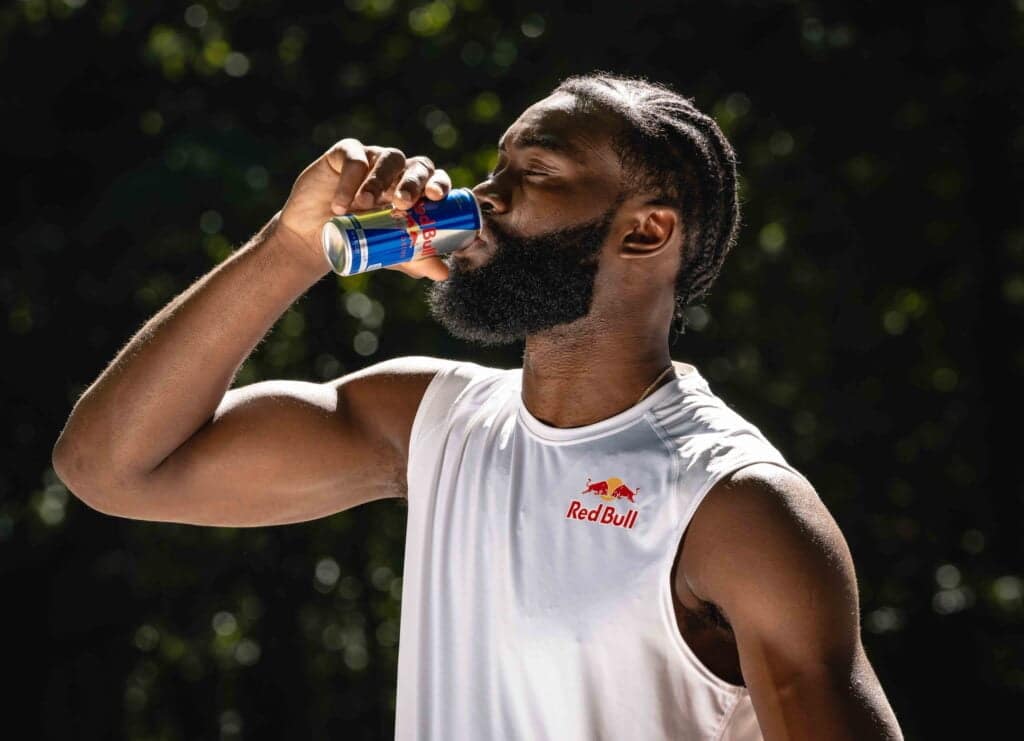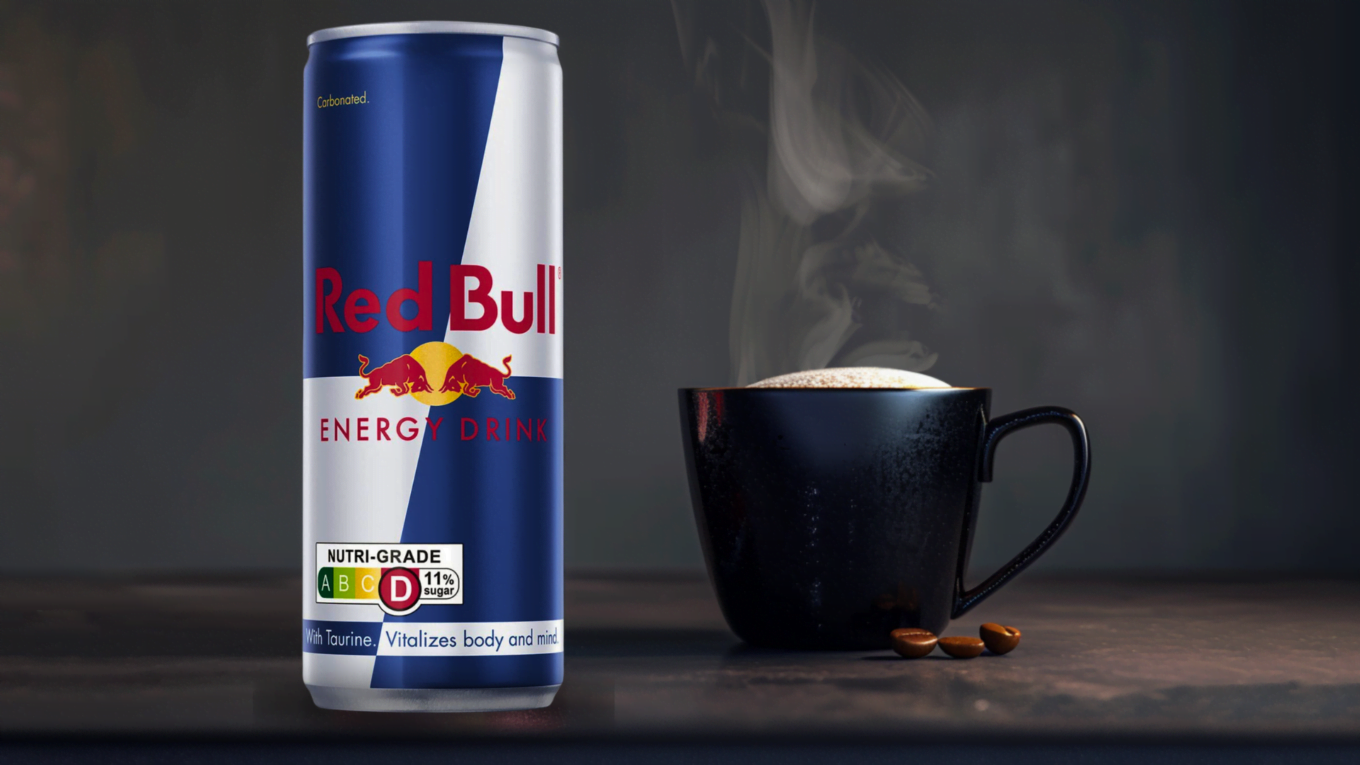Feeling tired and need a quick energy boost? You might wonder whether to reach for a cup of coffee or a can of Red Bull.
While both beverages contain caffeine, they have distinct differences that can affect their energy-boosting potential.
This article will explore the key factors that distinguish coffee and Red Bull, including caffeine content, nutrients, and potential side effects.
By the end, you’ll clearly understand which drink is better for your energy needs.
So, whether you’re a student looking to power through an all-nighter or an office worker trying to beat the afternoon slump, read on to discover the ultimate winner in the battle between coffee and Red Bull.
Coffee vs Red Bull: Caffeine Content and Immediate Effects
Caffeine Content Comparison
A standard 8-ounce cup of coffee contains around 95 mg of caffeine, while a typical 8.4-ounce can of Red Bull has about 80 mg.
Although coffee has slightly more caffeine per serving, the difference is insignificant enough to impact energy levels significantly.
Immediate Effects of Caffeine
Caffeine blocks adenosine receptors in the brain, leading to increased alertness and reduced fatigue.
Both coffee and Red Bull can provide a noticeable energy boost within 15-45 minutes of consumption, as the caffeine is quickly absorbed into the bloodstream.
Duration and Quality of Energy Boost
Duration of the Energy Boost
The effects of caffeine from both coffee and Red Bull typically last for several hours. However, the duration can vary depending on factors such as metabolism and tolerance.
On average, the energy boost from caffeine reaches its peak within 30-60 minutes and can last up to 4-6 hours.
Quality of the Energy Increase
Coffee tends to provide a more gradual and sustained energy increase, while Red Bull, due to its added sugars and other ingredients, may cause a more sudden and intense spike.
Some people may experience jitteriness or anxiety after consuming Red Bull, especially if they are sensitive to caffeine or consume it in excess.
Subsequent Energy Crashes
After the initial energy boost subsides, coffee and Red Bull drinkers may experience a “caffeine crash” characterized by fatigue, drowsiness, and irritability.
This crash is more likely to occur with Red Bull due to its high sugar content, which can cause a rapid rise and fall in blood sugar levels. However, individual reactions may vary.
Nutritional Content Comparison
Calories
An 8-ounce cup of black coffee contains just 2 calories, while a standard 8.4-ounce can of Red Bull has 110 calories.
However, adding milk, sugar, or cream to coffee can significantly increase its calorie count, with a cup containing cream and sugar having up to 120 calories.
Sugars
A can of Red Bull contains 27 grams (about 7 teaspoons) of sugar, while black coffee has no sugar.
The high sugar content in Red Bull can lead to a rapid spike in blood sugar levels, followed by a crash when the effects wear off.
Excessive sugar intake is also linked to various health problems, such as obesity, diabetes, and heart disease.
Essential Nutrients
Coffee is a good source of antioxidants, such as chlorogenic acid, which may help protect against cell damage and inflammation.
It also contains small amounts of essential nutrients like potassium, magnesium, and B vitamins (B2, B3, and B5).
Red Bull, on the other hand, is fortified with B vitamins, including B6 and B12, which are involved in energy metabolism.
However, the amounts of these vitamins in Red Bull are often much higher than the recommended daily intake.
Comparison of Additives and Their Effects
Red Bull Additives
Taurine is an amino acid commonly added to energy drinks like Red Bull.
While it is naturally found in the body and plays a role in cardiovascular function and muscle development, the effects of supplemental taurine are not well established.
Red Bull also contains preservatives and artificial colors, which may have negative health effects when consumed excessively.
Coffee Compounds
Coffee is rich in chlorogenic acids and antioxidants that may help reduce inflammation, improve glucose metabolism, and lower the risk of certain diseases, such as type 2 diabetes and heart disease.
The caffeine in coffee acts as a natural stimulant, improving alertness, concentration, and physical performance.
However, excessive caffeine intake can lead to side effects such as jitters, anxiety, and sleep disruption.
Typical Consumption: Contexts, Usage and Preferences
Morning Routine

Coffee is a staple in many people’s morning routines due to its natural origin and the comforting ritual of brewing.
The aroma and taste of coffee provide a soothing start to the day, and preparing it can be enjoyable in the morning.
In contrast, Red Bull is often chosen by those who prioritize convenience and a quick energy boost, as it requires no preparation and can be easily consumed on the go.
Midday Pick-me-up

Red Bull is often used as a midday pick-me-up when individuals need a rapid energy boost to power through short-term, high-energy demands, such as intense work deadlines or sports activities.
Its combination of caffeine, sugar, and other stimulants provides a fast-acting energy spike.
On the other hand, coffee is often consumed in the afternoon for a more gradual and sustained energy boost, and it is frequently enjoyed in social settings, such as grabbing a coffee with colleagues during a break.
Cultural and Social Considerations
Cultural Perceptions and Coffee
Coffee has a rich history and is deeply ingrained in many cultures worldwide.
It is often associated with social interactions, such as coffee breaks in the workplace or friends catching up at cafes.
In recent years, there has been a growing appreciation for artisanal coffee, with many people seeking high-quality, sustainably sourced beans and specialty brewing methods.
This trend reflects a broader cultural shift towards valuing craftsmanship, authenticity, and mindful consumption.
Energy Drinks and Social Identity
Red Bull and other energy drinks are often marketed towards younger demographics, particularly those engaged in high-energy activities like extreme sports, gaming, and nightlife.
The branding and advertising of these drinks often emphasize themes of adventure, risk-taking, and pushing boundaries, which can appeal to consumers looking to express a certain social identity.
As a result, energy drink consumption has become associated with specific lifestyles and subcultures, influencing consumer preferences and behaviors.
Short-term Health Impacts of Coffee vs Red Bull
Increase in Alertness
Both coffee and Red Bull contain caffeine, leading to increased alertness and improved cognitive function shortly after consumption.
However, the intensity and onset of alertness may differ between the two. Coffee’s caffeine is absorbed more gradually, providing a steady increase in alertness.
In contrast, Red Bull’s combination of caffeine, sugar, and other stimulants may produce a more rapid and intense boost in alertness.
Potential Jitteriness
Jitteriness is a common side effect associated with high caffeine intake.
This effect may be more pronounced in Red Bull consumers due to the higher caffeine content per serving and other stimulants like taurine.
Coffee drinkers may also experience jitteriness, particularly if they are sensitive to caffeine or consume large amounts.
Changes in Heart Rate
Caffeine in coffee and Red Bull can cause short-term changes in heart rate. Immediately after consumption, individuals may experience increased heart rate and blood pressure.
This effect can be more pronounced in those who are sensitive to caffeine or have pre-existing heart conditions.
Individuals with heart concerns must moderate their beverage intake and consult a healthcare professional.
Long-term Health Consequences of Coffee vs Red Bull
Risk of Diabetes from Red Bull
The high sugar content in Red Bull can contribute to an increased risk of type 2 diabetes when consumed regularly.
Studies have shown that consuming sugary drinks like Red Bull daily is associated with a higher incidence of type 2 diabetes.
Health organizations recommend limiting the intake of sugary beverages to reduce this risk.
Antioxidant Benefits of Coffee
Coffee is a rich source of antioxidants, such as chlorogenic acid, which can provide long-term health benefits.
These beneficial compounds are not present in Red Bull, which lacks the antioxidant profile of coffee.
Overall Long-term Risks and Benefits
Excessive caffeine intake from coffee and Red Bull may negatively impact bone density over time, as it can interfere with calcium absorption.
Additionally, the high sugar content in Red Bull, when consumed regularly, may contribute to an increased risk of metabolic syndrome, obesity, and related health problems.
Conversely, moderate coffee consumption (3-5 cups per day) has been associated with various health benefits, such as a lower risk of type 2 diabetes, cardiovascular disease, and liver disease.
To maximize the potential benefits and minimize risks, it is essential to consume these beverages in moderation and be mindful of individual health conditions.
Conclusion
In conclusion, when choosing between coffee and Red Bull for an energy boost, it’s essential to consider both the short-term and long-term effects on your health.
While both beverages quickly increase alertness due to their caffeine content, coffee may offer a more sustained energy boost with fewer potential side effects.
Additionally, coffee’s antioxidant properties can provide long-term health benefits, while Red Bull’s high sugar content may increase the risk of certain health problems when consumed regularly.
Ultimately, the choice between coffee and Red Bull depends on your preferences and health goals.
However, moderation is key, and it’s always a good idea to listen to your body and consult with a healthcare professional if you have any concerns.
So, which energy booster will you choose for your next pick-me-up?




